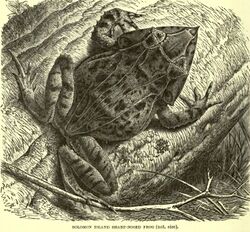Biology:Ceratobatrachidae
| Ceratobatrachidae | |
|---|---|

| |
| Cornufer guentheri | |
| Scientific classification | |
| Domain: | Eukaryota |
| Kingdom: | Animalia |
| Phylum: | Chordata |
| Class: | Amphibia |
| Order: | Anura |
| Clade: | Ranoidea |
| Family: | Ceratobatrachidae Boulenger, 1884 |
| Type genus | |
| Ceratobatrachus Boulenger, 1884
| |
| Genera | |
|
5, see text. | |
| Synonyms | |
|
Ceratobatrachinae | |
The Ceratobatrachidae are a family of frogs[1][2] found in the Malay Peninsula, Borneo, the Philippines , Palau, Fiji, New Guinea, and the Admiralty, Bismarck, and Solomon Islands.[1]
Taxonomy
Ceratobatrachidae was formerly treated as a subfamily (i.e., Ceratobatrachinae) in the family Ranidae (true frogs), but have now been re-classified as a separate family. The following genera are recognised:[1]
- Subfamily Alcalinae Brown, Siler, Richards, Diesmos, and Cannatella, 2015
- Alcalus (5 species)
- Subfamily Ceratobatrachinae Boulenger, 1884
- Cornufer Tschudi, 1838 (> 50 species)
- Platymantis Günther, 1858 (> 30 species)
- Subfamily Liuraninae Fei, Ye, and Jiang, 2010
- Liurana Dubois, 1987 (4 species)
Formerly, the following genera were also recognized in the family Ceratobatrachidae, but have now been merged into the genera above.
- Batrachylodes Boulenger, 1887 (8 species)
- Palmatorappia Ahl, 1927 (1 species)
- Ceratobatrachus Boulenger, 1884 (1 species)
- Discodeles Boulenger, 1918 (5 species)
Distribution
Ceratobatrachidae is distributed across Island Southeast Asia,[3] as well as in the Eastern Himalayas.
- Genus Liurana
- Eastern Himalayas: 4 species
- Genus Alcalus
- Borneo: 2 species (Alcalus baluensis and Alcalus rajae)
- Palawan: 1 species (Alcalus mariae)
- Genus Platymantis
- Philippines:
- Genus Cornufer
- Palau: 1 species
- Maluku: 3-4 species
- New Guinea: 6-8 species
- Bismarck Archipelago: 18-22 species
- Solomon Islands: 20-25 species
- Fiji: 2 species
Life history
All Ceratobatrachidae lay eggs outside of water and undergo direct development where eggs hatch directly into froglets, without free-living tadpole stages.[4]
References
- ↑ 1.0 1.1 1.2 Frost, Darrel R. (2014). "Ceratobatrachidae Boulenger, 1884". Amphibian Species of the World: an Online Reference. Version 6.0. American Museum of Natural History. http://research.amnh.org/vz/herpetology/amphibia/Amphibia/Anura/Ceratobatrachidae.
- ↑ "Ceratobatrachidae Boulenger, 1884". Integrated Taxonomic Information System. https://www.itis.gov/servlet/SingleRpt/SingleRpt?search_topic=TSN&search_value=773179.
- ↑ Brown, Rafe M.; Siler, Cameron D.; Richards, Stephen J.; Diesmos, Arvin C.; Cannatella, David C. (2015). "Multilocus phylogeny and a new classification for Southeast Asian and Melanesian forest frogs (family Ceratobatrachidae)". Zoological Journal of the Linnean Society 174 (1): 130–168. doi:10.1111/zoj.12232.
- ↑ Fuiten, Allison Marie (2012). Skeletal Variation in Melanesian Forest Frogs (Anura: Ceratobatrachidae). M.A. thesis , University of Kansas. pp. 69. http://kuscholarworks.ku.edu/dspace/handle/1808/10647. Retrieved 22 February 2014.
Wikidata ☰ Q55459 entry
 |

